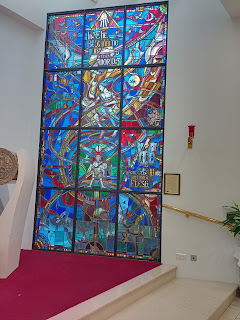The miracle of language never ceases to beguile me. With my tongue, lips and vocal chords, I can create vibrations in the air which, when they reach your ear, are decoded into ideas and pictures and emotions. This process, already magical and wondrous, can be captured by words on a page-- so that words can travel over continents and through the ages. Every now and again, the whole phenomenon strikes me with fresh wonder.
I've written a lot about poetry on this blog. People have given various definitions of poetry, but one of the more memorable ones is "the best words in the best order". In a way, though, I think words are a sort of poetry even before they're put into any order. You might even say that every word is a poem in itself, although "detergent" and "update" aren't particularly lyrical. (Ironically, the word "poetry" isn't inherently poetic, in my view.)
On the other hand, many words are inherently poetical. Others are more subjectively appealing.
What sort of words are inherently appealing? Well, the example that comes to my mind most readily are the names of gemstones: sapphire, amethyst, aquamarine, chalcedony, emerald, obsidian, and so forth. Now, you might say these words are appealing because of their association with the gemstones they describe, but I think that's only part of it. And quite often I have no image or knowledge of a particular gemstone and I still find the word poetic.
Wilde's masterpiece of decadent poetry "The Sphinx" draws lavishly on these poetic names:On pearl and porphyry pedestalled he was too bright to look upon:
For on his ivory breast there shone the wondrous ocean-emerald.
(There's a lot more where that comes from.)
This particular strain of poetry is also to be found in the Bible, particularly the Book of Revelation's description of the walls of the New Jerusalem: "The first foundation was jasper. The second was sapphire. The third was chalcedony. The fourth was emerald. The fifth was sardonyx. The sixth was sardius. The seventh was chrysolite. The eighth was beryl. The ninth was topaz. The tenth was chrysoprasus. The eleventh was jacinth. The twelfth was amethyst."
I'm guessing that many of these terms come from Latin and Greek, which perhaps give them that flavour of the exotic, antique and classical from which much of the poetry derives.
Colours and hues often have very poetic names, as well: indigo, heliotrope, burgundy, onyx, cerulean, turquoise, aquamarine, magenta.
Funnily enough, I would make the argument that many diseases have perversely appealing names: gonorrhea, chlamydia, rubella, melanoma, meningitis, and so forth. (You may not agree on that, though).
Another class of words that seem to be inherently poetic, although I think this certainly has a lot to do with meaning as with sound, involve faintness or obscurity: silhouette, whisper, echo, shadow, ghostly, phantasmagoric, rumour, shimmer, flicker, and so forth.
I could go on with lists of word-groups that seem to be generally appealing, but I'll move on to words and phrases that appeal especially to me.
One of my very favourite words is "lobby", and another is "foyer". Of course, "foyer" has a bit of a French glamour to it, but I think the main reason I love both these words is because they describe liminal spaces. I also love (to varying degrees) corridor, plaza, mezzanine, mall, street, alleyway, and avenue. I feel I should include "attic" in this list, even though it's not a liminal space in the same sense as the others; it's not a "between" place like the others. But it's liminal in another way, although it's hard to put my finger on its liminality. (This article addresses this very subject, although it's a bit too woke for my taste.)
Why do I like terms for liminal spaces so much? It's hard to say. There's something very exciting about a liminal space, especially one that is a mixture of "inside" and "outside". All life, all drama is lived in the space between me and you, us and them. Public or semi-public places seem ripe for this drama.
A final place-word which appeals to me enormously, even though it's not really liminal, except insofar as every place could be liminal in some way: canteen (as in, a cafeteria). I love the word canteen. It's so cheerful, down-to-earth, unpretentious, and redolent of a collective life of some kind. I like restaurants which are more like canteens, such as the restaurant in IKEA.
Here's a round-up of some other words I especially love: kaleidoscope, sepia, merry-go-round, horizon, gossamer, alabaster, brandy. I could add many, many more, and I probably will.
Poetry has already begun, in the more conventional sense, when we put words together. So perhaps it's legitimate to say that phrases are already poems, ready-made poems, as it were.
Finally, a list of phrases that excite me (mostly quarried from a previous post):
Softly-falling snow.
The cold light of day (which is supposed to be sobering, but which I find reassuring).
Deep waters.
Dizzy heights.
The morning after the night before.
Down memory lane.
The silver screen.
Till the cows come home.
All human life is there.
Blue moon. (I'm told the song of this title was my mother's party piece.)
The dead of night (also the title of one of my favourite films, Dead of Night from 1945).
The middle of nowhere.
The back of beyond.
In at the deep end.
Burning the midnight oil.
The last bus home.
Night train. (There was a radio show with this title in my childhood, which was broadcast all night long-- or at least, that's the impression I got.)
The graveyard shift.
The old, old story.
The small hours.
The wee hours.
Any phrase involving "country", in this sense: bandit country, cowboy country, gator country, Brontë country, Kavanagh country, etc.
What are some of your favourite words and phrases? No, really, tell me!

















































